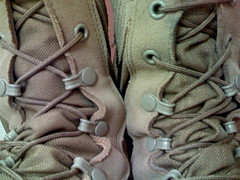 My colleague Robin Sinn had such a good time this past spring at boot camp for science librarians that I jumped at the opportunity to attend the Social Sciences Librarians Boot Camp, hosted by the Tisch Library at Tufts University in Medford, Massachusetts.
My colleague Robin Sinn had such a good time this past spring at boot camp for science librarians that I jumped at the opportunity to attend the Social Sciences Librarians Boot Camp, hosted by the Tisch Library at Tufts University in Medford, Massachusetts.
This was a one-day workshop (but could have been longer) with attendees mostly from the East Coast but including some from the University of Illinois at Urbana-Champaign and the University of Notre Dame. The Tisch Library did a great job of hosting us, providing food and drink (yes, in the library!), meeting spaces, and making it a green conference. Informed by our own sustainability initiatives and having enough library swag for a lifetime, I appreciated the “greening” of the conference.
The day was divided into two main parts. All of us attended a morning presentation titled “Haiti: Before and After the Earthquake.” Dr. Robert Rotberg led off, giving us background on Haiti, discussing the country’s chances for democracy and reminding us that 75% of the population lives below the poverty line. Nathan Nickerson, executive director of Konbit Sante, an NGO whose mission is to build the capacity of Haiti’s healthcare system, followed Rotberg. Nickerson discussed the earthquake and pointed out that when all attention is on Port-au-Prince, what happens to everything else? Rosalind Sewell, a recent graduate of Tufts’ Fletcher School, concluded the morning’s discussion with a demonstration of crisis mapping for Haiti deployed by Fletcher School students and other volunteers. Using open source tools and crowd sourcing, information was collected and shared.
Three simultaneous sessions were held in the afternoon, and having failed to clone myself, I could only attend one. Although “Hands-on Introduction to GIS for Social Scientists” and “Understanding and Working with Data” both looked great, I knew I had experts here to help me with those topics, so I chose to attend “Social Sciences Research Methods.” This was a wonderful session that featured three professors, one in Political Science, one in African American Studies, and one in Sociology. They discussed their disciplines (e.g., “is political science a science?”), the communities they study, and the research they engage in (qualitative and quantitative). Resources they use include a mix of subscription databases, like Worldwide Political Science Abstracts, datasets like ICPSR, and free resources like Migration Policy Institute’s Data Hub. They share librarians’ frustration when interfaces change and they have to learn a new way to search.
We finished the day with a plenary session on Open Access, delivered by Dr. Alec Peck. Peck is a great proponent of open access, having edited the journal Teaching Exceptional Children and guided it to an OA version, Teaching Exceptional Children Plus. Dr. Peck knew that with librarians, he was preaching to the choir, but I still found his talk engaging as he advised us to promote open access as an ethical issue. He referred to a term a colleague had borrowed from Jean-Claude Guedon—“cognitive apartheid”—that keeps people from information and research and reminded us that we needed to be the campaigners for open access. With that in mind, stay tuned for announcements of how we’ll spend Open Access Week in October!
